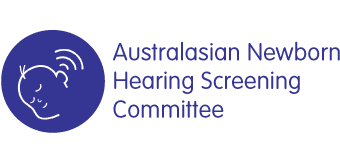
2013 Conference Handbook
NHS – why did we start it, what are we achieving and where do we want to go?
The idea of “Saving deaf children” – The role of Family Centered Counseling & Informed Choice – Capi Wever
Download presentation | Download transcript
Not everything that counts can be counted and not everything that can be counted counts: perceptions of quality in newborn hearing screening programmes – Gwen Carr
Download presentation | Download transcript
Presentations
Friday
Concurrent 1A – Supporting families (Part I)
- Family-centred early intervention for children with a permanent hearing loss: insights from parental consultation – Nic Mahler
- Caregivers’ experiences with the diagnosis of hearing loss – Elfriede Rohrs
- “How early is too early?” – The outcomes of cochlear implantation in infants under 6 months, 7-9 months and 10-12 months – Katie Neal –
- Adapting a coordinated early intervention service to best support the families of babies screened under UNHS – a New Zealand perspective -Lydia O’Connor
- Bilateral cochlear implantation in children identified in newborn hearing screening: why the rush? – Maree McTaggart
- Journey to a cochlear implant following a hearing loss – Janeen Jardine
- “No discipline is an island”: working together to support families who need it the most – Renee Bennett
- Newborn hearing screening facilitates early diagnosis of congenital CMV infection – Carolyn Cottier
Concurrent 1B – Maintaining motivation and quality assurance in newborn hearing screening programme (Part I)
- Natural disasters and a newborn hearing screening programme: maintaining services, quality and sanity – Angela Deken
- Implementation of an early hearing detection management and information system to improve quality and standardisation in Queensland – Rachael Beswick
- Reflections on an investigation into reported changes in rates of referral from screening to diagnostic assessment – Loren Catherine
- Screening infants who are young and too young: an analysis of gestational age at screening in Victoria – Gabrielle Kavanagh
- How a hearing screening programme database can result in both quality improvements and cost savings – Bronwyn Craig
- When a unilateral refer reveals a bilateral loss on diagnosis: cause for concern? – Rosemary Douglas
- VicCHILD: establishment of the world’s first population-based childhood hearing impairment longitudinal databank – Zeffie Poulakis
- Screening anomalies in newborn hearing screening programmes in NZ – Andrea Kelly
Plenary / Panel session – Expect the unexpected: managing incidents and improving quality in screening programmes
- Dr Jane O’Hallahan
- Jane McEntee, Group Manager, National Screening Unit, Ministry of Health, New Zealand
- Moira McLeod, UNHSEIP Programme Leader, National Screening Unit, Ministry of Health, New Zealand
Saturday
Concurrent 2A – Effective evidence-based ways of delivering early intervention programmes
- Nga Kohungahunga Turi: envisioning a whanau-centred approach to early intervention – Kirsten Smiler
- Developing a blended service model to deliver family-centred early intervention – Melissa McCarthy
- Barriers to early intervention service delivery for children with hearing loss – the Queensland experience – Helen-Louise Usher
- “Learning to listen to a baby who cannot hear” – Valerie Green
- Impact of the presence of auditory neuropathy spectrum disorder on outcomes at 3 years of age – Kirsty Gardner-Berry
- Responding to the needs of families of children with unaidable mild and borderline hearing losses – Felicity Hodgson
- Tele-Practice: delivering early intervention and audiology services to families in rural and remote areas – Jackie Brown
- A home based model of cochlear implantation: the role of telepractice – Melissa McCarthy
Concurrent 2B – Maintaining motivation and quality assurance in newborn hearing screening programme (Part II)
- The pieces of the jigsaw puzzle: The range of tools and resources required to deliver a quality newborn hearing screening programme in New Zealand – Moira McLeod
- Identifying ethically important scenarios in newborn hearing screening – Felicity Hood
- Overcoming challenges of delivering a newborn hearing screening program in a tertiary care hospital in India – Aishwarya Nallamuthu
- Are we screening the correct baby? – Jill Clarke
- Rescreening infants in Victoria 2011-2012 – Melinda Barker
- Cultural issues in hearing screening – Donna Barker
- Maintaining and retaining a competent screener workforce – Jenny Woodward
- Holding onto the tail of the tiger: education and training of the newborn screening workforce in New Zealand – Sian Burgess
Concurrent 3A – Mixed sessions. Targeted surveillance, late onset hearing loss and cochlear implantation
- Recommendations for monitoring hearing in children using a risk factor registry – Rachael Beswick
- Success of risk indicators for detecting late onset and progressive hearing loss – an analysis of the New Zealand protocol – Andrea Kelly
- Weaving the tapestry – Suzanne Harris
- Universal, risk factor and opportunistic screening for congenital hearing loss: 5-6 year old population outcomes – Zeffie Poulakis
- Sequential cochlear implantation in children – does age at second implant matter – Pat Tuohy
- Pathways to cochlear implantation following identification of hearing loss from newborn hearing screening – Beth Atkinson
- Creating a baseline – Suzanne Harris
Concurrent 3B – Supporting families (Part II)
- Parents and deaf and hard of hearing adults: supporting families in screening programs – Sharon Ewing
- The experiences of hearing siblings when there is a deaf child in the family – Liz Ray
- The Victorian infant hearing screening program early support service – Julie Gillespie
- Coordinated tertiary care: childhood hearing clinics, Queensland – Kym Adamson
- Cultural issues in screening – Suzanne Harris
- The evaluation of a 2000hz auditory steady state response newborn hearing screening protocol – Karin Van Der Merwe
- Workshops for parents of children with unilateral/mild hearing loss identified through UNHSEIP programme – Sargunam Sivaraj
